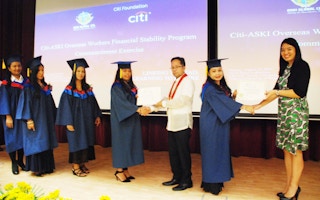The Citi Foundation and ASKI Global on Sunday recognised 134 overseas workers in Singapore who are newly graduates of its one-year financial education programme, which aimed at teaching them and their next-of-kin how to better manage personal finances and learn ways to improve their livelihoods.
The Citi-ASKI Overseas Workers Financial Stability Programme was introduced in Singapore to empower migrant workers in the country, particularly for Filipinos working as household service workers, Citi said, and help them achieve their short and long term financial goals through acquired financial and entrepreneurial skills.
These domestic workers earn a minimum wage of about US$400 as set by the Philippine government.
The foundation arm of the United States financial firm Citigroup, which funded the programme, has partnered with Singapore-based nonprofit coaching and training organisation ASKI Global to execute the programme. Citi also provided volunteer trainers from its staff, who share financial knowledge and skills on how these workers can save from their income and manage their debts, as well as ways on how to pursue other livelihood and business opportunities.
“
Migrant workers of other nationalities have also expressed their interest in the programme, prompting the organisers to expand it to all foreign worker communities in the country
The programme aims to promote inclusive development and is a key focus of Citi’s corporate citizenship, said Citi Asean chief auditor Margie Pagdanganan. “We look to provide financial opportunities, access, knowledge and support for underserved communities and individuals and the Citi-ASKI Overseas Workers Financial Stability Programme does exactly this,” added Pagdanganan, who is also a volunteer trainer for the programme.
There are now a total of 492 overseas workers who are recipients of the programme since it started in 2012.
The new graduates, who received their completion certificates during a ceremony at the National University of Singapore Town Plaza Auditorium, were required to submit their five-year financial goal plan at the end of the programme before they could qualify as graduates.
These financial plans should highlight their change in mindset in relation to remittance behaviours and financial management skills. They were also required to participate in an oral recital to present their plan to a panel, added ASKI.
The number of students have grown through advocacy campaigns by volunteers and word-of-mouth marketing by previous graduates, ASKI Global told Eco-Business. Migrant workers of other nationalities have also expressed their interest in the programme, prompting the organisers to expand it for all foreign worker communities in the country, regardless of gender and employment background.
Classes are held on Sundays, which is the usual off days for the workers and are flexible to accommodate the workers’ limited availability. They can choose to attend the sessions either once, twice or on all Sundays of the month, as well as the option to take either morning or afternoon classes, explained ASKI.
Enrollees, who pay S$100 for the whole programme, are also required to nominate one next-of-kin living in their home country, who in turn will attend a back-to-back training on financial education carried out by ASKI’s partner organisations in the Philippines, the training firm added.
Citi and ASKI noted the graduates showed changes in attitude towards managing incomes and expenditures with 90 per cent of them now saving their income through banks both in Singapore and the Philippines and half of them have invested in microenterprises in the Philippines using their savings.
They also reported that 30 per cent have accessed microfinance programmes and 13 per cent invested in financial instruments such as stocks, bonds and insurance plans.
“On the back of the programme’s encouraging results, I look forward to a continued partnership with Citi to further extend the reach of our financial education efforts to the migrant worker population in Singapore and their families back in the home countries,” commented ASKI Global’s chief executive officer Irma L. Cosico.
The nonprofit groups said applications for the next round of programme will open this December for about 200 migrant workers.

















